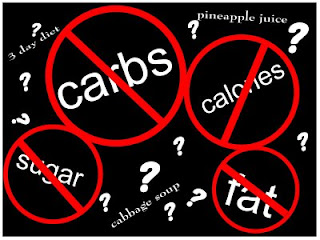- Back to Home »
- Weight Loss »
- Weight Loss Diets
Posted by :
Moraliss
Monday, February 4, 2013
 Being overweight increases your risk for high blood pressure, heart disease, stroke, diabetes, and some forms of cancer. If you are overweight, losing just 5 to 10% of your weight and keeping it off lowers your risk for developing most of these diseases.
Being overweight increases your risk for high blood pressure, heart disease, stroke, diabetes, and some forms of cancer. If you are overweight, losing just 5 to 10% of your weight and keeping it off lowers your risk for developing most of these diseases.What foods should I limit or avoid?
As much as you can, avoid the following types of food :
- Refined carbohydrates (sugar) and foods containing added sugars, such as sucrose, glucose, dextrose, highfructose corn syrup, corn sweetener, honey, and brown sugar
- Refined grain products such as white rice and white flour (Try to substitute whole grains for refined grains whenever you can.).
Also avoid :
- Saturated fats such as butter, cream cheese, poultry skin, whole-milk dairy products (including cheese), and fat on meats
- Other foods that often contain a lot of fat and trans fats, such as pastries, cakes, cookies, potato chips, and crackers.
- Fried foods
- Packaged meats because they are often high in fat, salt, and preservatives (Look for low-fat, low-salt varieties).
If you choose to drink alcohol, do so in moderation. Moderate drinking means up to 1 drink a day for women and up to 2 drinks for men. A drink equals 12 ounces of regular beer, 5 ounces of wine, or 1 and 1/2 ounces of 80-proof distilled spirits. Remember that alcoholic beverages add calories to your diet with very little nutrition.
What are calories ?
A calorie is a way to measure the energy value of food. Your body burns calories to use for basic body functions. Proteins, carbohydrates, and fats contain calories and produce energy. To lose weight, reduce the calories in the food you eat (without giving up nutrition). Increase the number of calories you use in physical activity. Your body will burn fat stored in your body to get the energy it needs and you will lose weight.
Eating 500 calories a day less than you need to maintain your present weight can result in losing 1 pound a week. Try to lose 1 to 2 pounds a week. If you lose more than that each week, you begin to lose muscle rather than fat.
Most weight loss diets suggest 1200 to 1500 calories a day for women and 1500 to 1800 calories a day for men. However, calorie needs can vary a lot depending on your activity level and current weight. Ask your healthcare provider or dietitian to help you determine how many calories you need a day.
Don't reduce your calories too much. If you get too few calories a day, your body will shut down its metabolism so that you can survive the lean time. This can happen if you go on a "starvation diet." The body's survival response will then stop you from losing weight.







